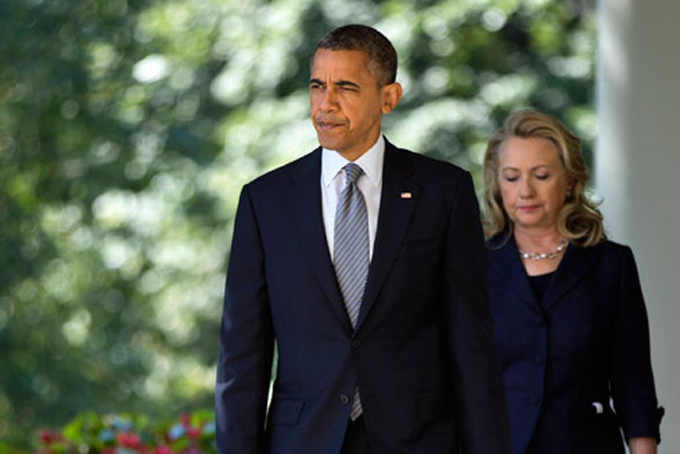
WASHINGTON (AP) _ When President Barack Obama praised the Supreme Court’s watershed same-sex marriage ruling, he held it up as evidence that a “shift in hearts and minds is possible.”
Obama may well have been describing his own public trajectory on gay unions _ a complicated path that took him through opposition and ambivalence to enthusiastic embrace.
His journey is not unlike the rest of America. But over the years he has worn his uncertainty on his sleeve, publicly musing about his stance before becoming a full-throated advocate for marriage and other aspects of gay rights.
“When all Americans are treated as equal, we are all more free,” Obama declared Friday.
As far as political figures go, Obama’s road to “yes” is hardly unique.
Hillary Rodham Clinton’s presidential campaign jumped on the Supreme Court decision, changing its red campaign logo to a rainbow colored H, releasing a gauzy video of gay wedding ceremonies, and blasting out supportive tweets aimed at building its campaign list.
In a fiery speech Friday night to Democratic activists in Northern Virginia, Clinton said that “love triumphed in the highest court” and declared: “We can sum up the message from the court and the American people in just two words: Move on.”
But like Obama, such expressions of support mark a remarkable shift for Clinton, who opposed gay marriage for more than two decades as a first lady, a U.S. senator and a presidential candidate. Just three months ago, Clinton’s position was that while she personally supported gay marriage the issue was best left for individual states to decide _ a policy stance held by most of the Republican presidential field.
“It has been an evolutionary process,” said Fred Sainz of the Human Rights Campaign, a national gay rights group. But he said Obama now stands as one of the great champions of gay rights, up there with the likes of Harvey Milk. As for Clinton, he said, “she connects with gay people on a level that is beyond explanation.”
Obama has carefully staked out his position on same-sex marriage throughout his political career. During his 1996 Illinois state Senate race, he replied to a questionnaire from a gay newspaper in Chicago: “I favor legalizing same-sex marriages, and would fight efforts to prohibit such marriages.” Two years later, he declared himself undecided.
By 2004, as he ran for the U.S. Senate, he said he opposed gay marriage for politically strategic reasons, saying Republicans would exploit the issue, and he advocated instead for gay civil unions. In his 2006 book, “The Audacity of Hope,” he cited his own faith as a reason to oppose same-sex marriage, though he also wondered whether “in years hence I may be seen as someone who was on the wrong side of history.”
He came out firmly for same-sex marriage in 2012 and called for it in his second inaugural address. But earlier this year, his former top strategist, David Axelrod, wrote that Obama had feigned opposition to gay marriage for most of his political career, grudgingly taking Axelrod’s advice that African-American religious leaders and others would oppose him if he let it be known he supported gay marriage.
“If Obama’s views were `evolving’ publicly, they were fully evolved behind closed doors,” Axelrod wrote.
Obama disputed the account, telling BuzzFeed News that he thought civil unions were “a sufficient way of squaring the circle,” but that “the pain and the sense of stigma that was being placed on same-sex couples who are friends of mine” changed his mind.
“I think the notion that somehow I was always in favor of marriage per se isn’t quite accurate,” Obama told BuzzFeed.
But even after he endorsed gay marriage, he took his time embracing other aspects of the gay community’s agenda.
It wasn’t until July 2014 that Obama gave employment protection to gay and transgender workers in the federal government and its contracting agencies.
Still, gay rights advocates hold him up as one of their biggest political advocates.
“It’s absolutely right to note that this administration did not get off to a good start with LGBT advocates,” Sainz said. “But the sheer volume of what he has done will be hard for another president to replicate, simply because so much of what he has done has been so incredibly powerful, momentous and life changing for LGBT people.”
Clinton’s path into the embrace of the gay community has been similar. She backed her husband’s Defense of Marriage Act in 1996, described marriage between a man and a woman as a “fundamental bedrock principle” in a 2004 Senate floor speech, and dodged the question when asked in 2007 whether she agreed with Gen. Peter Pace, then the Joint Chiefs of Staff chairman, that homosexuality was immoral.
But as secretary of state, Clinton emerged as a champion of gay rights, declaring that “gay rights are human rights, and human rights are gay rights,” at a 2011 conference in Geneva.
Sainz said that in Clinton, the LGBT community sees a kindred spirit. “It’s in our DNA to support her,” he said. “We have been forced to deal with some of lives greatest indignities and have come out on the other side.”
